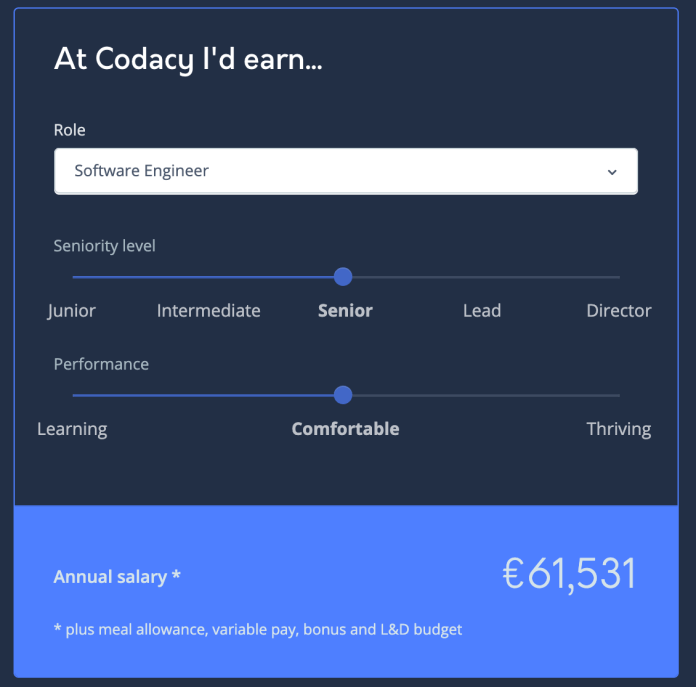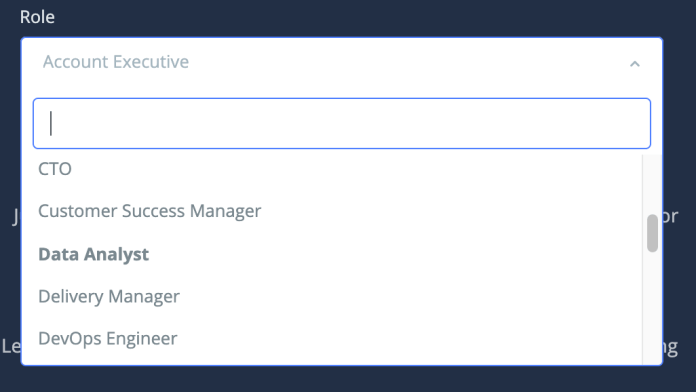Open salary calculator: our commitment to transparency and fairness

Here at Codacy, we are committed to being a fully transparent company. So back in 2019, we launched our open salary calculator and made it publicly available. Let’s take a deep dive into why we’ve chosen to do this and how the salary calculator works.
First of all, we are proud to define ourselves as brutally honest but kind. This honesty is also reflected in our way of dealing with salaries and money — yes, even our financial status and revenue are shared with every team member, independently of their role.
Over the years, we have found that transparency and honesty build an environment of trust, they hold us accountable, and they can also push our industry forward.
Salary transparency, in particular, can be highly beneficial. You can use our open salary calculator to determine what you would make if you were part of our fantastic team at Codacy. Our open salary calculator can also be helpful when applying for another company, to see if they offer a fair value. But of course, we hope you would join our team instead 😉
Why have an open salary calculator
In a nutshell, the information provided by our open salary calculator can help determine fair and competitive salaries across various roles and levels of experience. We are focused on a series of key principles.
Transparency
Openly sharing salary information creates trust, holds ourselves accountable, serves as a resource for the industry, and distinguishes us from other companies. When hiring, candidates don’t have to negotiate salaries blindly. Plus, when moving inside the company, team members can see the salary adjustments for the change.
Fairness and inclusion
Our open salary calculator ensures that we are playing equitably to those with the same role and responsibilities at the same experience level. This helps reduce inequalities and unconscious bias and avoids giving higher pay just to people who can negotiate better.
Efficiency
By having an open salary calculator, there is no need to have numerous back-and-forth conversations when hiring. We can apply the same to promotions or any other change in roles and levels of responsibility.
Results
Our open salary calculator is also a way to empower our team members and reduce time negotiating salaries. As a result, our team members are fulfilled and engaged with their work, without worrying about whether they are receiving fair pay. As such, they can focus on building solutions to help our clients ship better code.
Our salary calculator formula
This is how our formula looks like:
Salary = Role x Seniority x Performance
We derive every base salary at Codacy from our salary formula. This approach minimizes biased decisions about salaries (e.g., gender wage gap) since our formula has its roots in factors applied consistently across the team. We were inspired by other public calculators like Buffer’s and Gitlab’s (currently only available to employees) and adapted them better to fit our team and stage as a company.
The salary calculator formula considers the base salary for a specific role and multiplies it with criteria relative to career progression, like seniority and performance. Let’s take a deeper dive into this formula.
How we determine role compensation
We benchmark each role in our open salary calculator to Buffer’s Benchmark data, which has Radford as a base. This platform uses global surveys twice per year to gather compensation and benefits data from different companies.
Codacy’s role benchmark is based in the software industry. We then cross-checked it against other sources: Gitlab Compensation Calculator (currently only available to employees), Betts Recruitment, Glassdoor, Payscale, Salary.com, and LinkedIn Salary tool. And talking about LinkedIn, do you follow us there? Let’s connect!
We combined these multiple available benchmarks and adapted them to the San Francisco market, to determine the 50th percentile base salary for a specific role. Being Codacy a Portuguese company with the HQ in Lisbon, why have we selected San Francisco? Here are our reasons:
- Our roles, skill sets, product offering, technologies used, and overall strategies are more aligned with San Francisco’s market than with Portugal’s market.
- The amount of data available for the San Francisco market is higher than what is available for the Portuguese market, making the information more reliable.
- As a remote-first company, we need a salary calculator that we can use in multiple locations around the world.
How we apply seniority
Seniority, in our open salary calculator, indicates the level of experience of the team member, being related to the ability to perform and drive tasks that are expected for that particular role. We use a seniority factor between 0.7 and 1.9, as follows:
- Junior: 0.7
- Intermediate: 1.0
- Senior: 1.3
- Lead: 1.6
- Director: 1.9
How we apply performance
Performance, in our open salary calculator, indicates the performance of the team member, and it can also be applied to new hires based on the feedback from the interview process. We use a performance factor between 0.9 and 1.1, as follows:
- Learning: 0.9
- Comfortable: 1
- Thriving: 1.1
Considerations on the cost of living
When making the final salary calculation, we also take into consideration that we are a global team. However, as we moved to a remote-first company, and encourage our teams to enjoy the environment that suits them best, we do not forget that we believe that everyone should be able to live a good and comfortable life. This means that we don’t exploit people living in places where wages are generally lower, and we don’t reduce the purchasing power of people living in highly costly areas.
Other compensations
Besides the base salary, meal allowance, and bonus, we also implemented the learning & development (L&D) budget. This helps our team members to achieve their learning goals and maximize their success, as well as the success of the company. Investment in development is key.
.svg)






